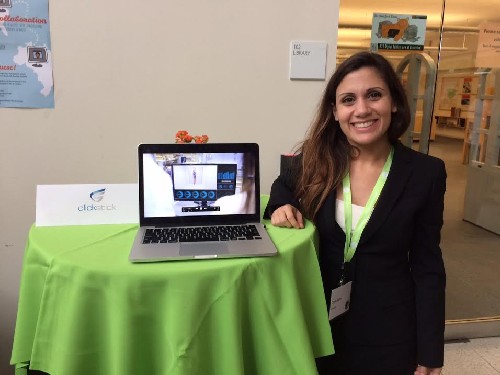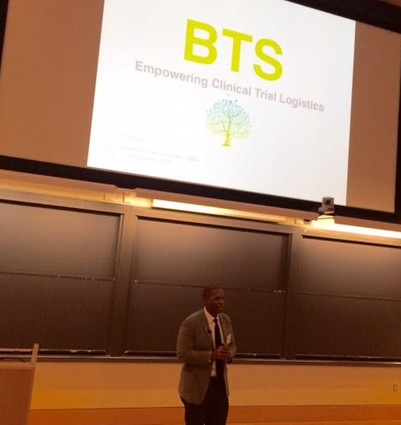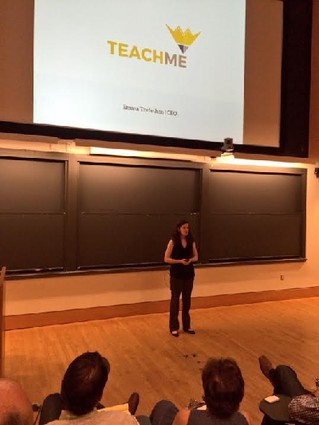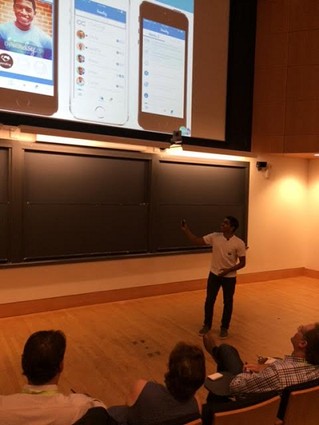Keller Center eLab Startups Present at Princeton Demo Day, Part Two
[This is part two of a two-part article on Princeton University’s eLab Demo Day 2015.]
For the past several years, Princeton’s Keller Center has run a summer accelerator called “eLab” for startups from the school, providing each participating team with $20,000 in seed money, a place to work, and mentoring. This year the teams presented at eLab Demo Day, on August 11.

ClickStick
ClickStick solves a serious medical problem: the imprecise application of prescribed topical gels or creams. The team began with an amusing video for the “first smart electric deodorant,” but quickly noted that the possibilities for the product were so much more than this. Speaking for the company, Gilad Arwatz explained that ClickStick will allow users to apply the exact amount of medication they are prescribed to the correct location, something that is very important in hormone replacement therapy and skin cancer treatment.
“There is an increased trend to go to topical medications to avoid what we call ‘first-pass metabolism,’” Arwatz explained. That’s when the drug breaks down in the gastric system. But topical administration also has some problems. For example, when the drug is applied with the hands, significant amounts of the substance are absorbed into the hands. “I can guess that most of you have applied sunscreen at some point, and some has ended up in your eye” he told the group. “That’s not so bad.” However, if you end up with a powerful medication in your eye, that’s really bad, he said. The device also reduces the risk that others will come into contact with the medication, if it drips on the floor or in the sink, for example.
Arwatz said that the user keeps the ClickStick applicator and just refills it. And the applicator connects to an app on a mobile device for compliance purposes. He added that the startup envisions its first market to be compounding pharmacies because the barriers to entry are lower there. Eventually, the company would like to license the device to pharmaceutical companies.

Bodhi Tree Systems (BTS)
Jared Crooks the founder of Bodhi Tree Systems, told the eLab audience that BTS is a “clinical trial logistics company” focusing on “reducing the amount of paperwork in clinical trials.” This is actually a complex problem, he noted. Clinics can be running many trials at once, and each phase-three trial can include thousands of patients and hundreds of nurses who are dispersed geographically.
Typically, the notes taken from patients are written down and then transcribed into some kind of a system. There is a lot of redundant information that is copied from form to form. It usually takes 7 minutes to transcribe the notes, multiplied by thousands of records. Clinical trial sponsors don’t receive the information for three days, but three days is too long, he said. Trials are designed to fail quickly because pharmaceutical companies don’t want to spend money on them if they are not going to be successful, he said.
BTS has developed a prototype application, and needs $100,000 to complete the beta testing with pharmaceutical companies. The group has partnered with a small biopharmaceutical company to co-build the system. “There are companies managing the larger issues of clinical trials, but none of them are focusing in on the most redundant problems,” Crooks said.
One member of the feedback panel asked why this kind of application wouldn’t be developed by a big pharma company on its own. Crooks answered that most clinical research centers deal with multiple pharmaceutical trials from multiple companies, each with its own forms. As an outside company, BTW can be agnostic regarding the individual pharmaceutical company’s paperwork, he added.

TeachMe
TeachMe is a platform that connects college students who want to share their knowledge, skills and experience with others who want to learn from them. The founders said that people often want to learn practical things — for example, how a 3D printer works — but can’t find the right people to teach the specific skill. A student may be having a tough time in a course and need someone to teach a particular concept, so he or she can get over a hump. Or students may be taking an online course, which is great until they get stuck.
“Often what makes or breaks us learning a new endeavor is having that connection with someone who is excellent at what you want to learn,” said cofounder and CEO Emma Trefethen. The startup differentiates itself, she said, “by really caring about person-to-person learning and user-driven content.”
TeachMe has a two-person team of very talented learners, one of whom was a Phi Beta Kappa. “We are super nerdy,” but “we found there were things we struggled with on campus,” and that gave rise to the idea for TeachMe, she said. TeachMe also helps solve an age-old problem for college students: how to earn more money. “We want to give students a chance to make money with what they love to do,” Trefethen said. The founders are beta testing the site now, and are aiming for 2,000 initial signups and 500 active users. If all goes well, the company will have a wider launch in January.

Friendsy
Friendsy was back for the second year at the eLab Demo Day, but the company has evolved and has raised slightly more than $700,000 since its inception. We covered last year’s presentation here.
Friendsy is a college-based social network that lets students anonymously chat and connect with each other in friendly and romantic ways. It only allows students who have a valid dot-edu address to use the app, which reinforces its promise to users: everyone who is on the site will be a verified college student. “We launched this in 2013 and registered more than 1,000 users in one week. Since then we’ve been working on building a rich feature set” around the function Friendsy started with, said cofounder and CEO Vaidhy Murti. For the last year, the company has been beta testing at various schools. “Now we are up to 84,000 users, and we have deep penetration as well. Over 50 schools have more than 500 users.” Friendsy has also made more than 75,000 mutual matches so far, in its safe, curated environment.
The newest feature on the Friendsy app is a topic-oriented chat application. “We think we can make chatrooms great again by creating curated rooms where students can chat in real time,” Murti said. He added that the company brainstormed the idea for the chat rooms, and then had the feature up and running very quickly. “Our team is especially good at execution.” And the team builds everything in-house, keeping costs low.
Friendsy also instituted a summer location feature. “If you specify your location, the app will be tailored to that location,” he said.
The next goal for Friendsy is to achieve 300,000 users, according to Murti. To do this, the company is spending some money on campus reps, who will help acquire users through events and other promotional activities. One of the feedback panelists noted that, rather than just acquiring users, the team should think about the growth dynamics of the company, and how it could grow within a campus.

